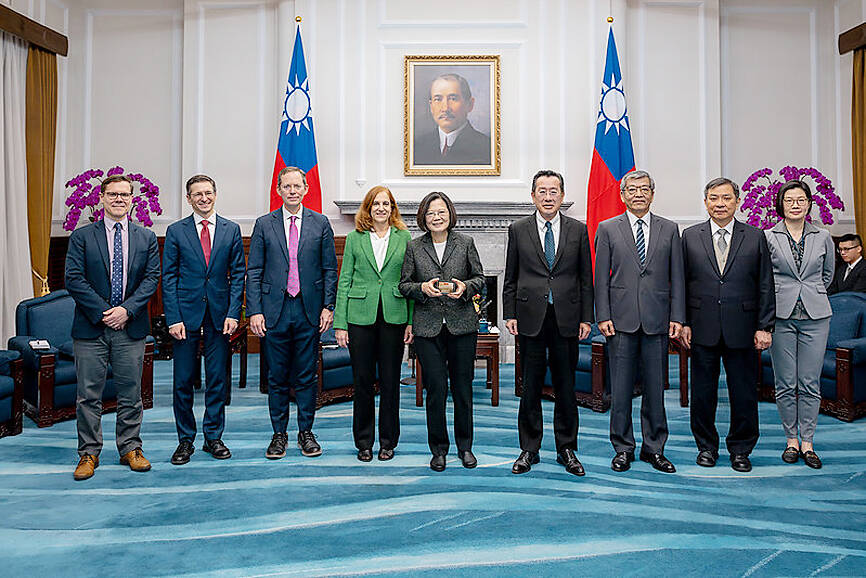President Tsai Ing-wen (蔡英文) yesterday urged like-minded nations to unite in safeguarding democracy and freedom, while calling for deeper ties with the US to contribute to regional prosperity.
Tsai made the remarks while welcoming a delegation of academics from Washington to the Presidential Office yesterday. They included German Marshall Fund Indo-Pacific Program managing director Bonnie Glaser, Eurasia Group China practice managing director Rick Waters, American Enterprise Institute senior fellow Zack Cooper and Freeman chair in China Studies at the US Center for Strategic and International Studies Jude Blanchette.
Tsai said that with the Taiwan Relations Act turning 45 next month, she looks forward to exchanging opinions on Taipei-Washington relations with the delegation.

Photo: Screen grab from the Presidential office’s Web site
The international situation has evolved since the act was passed in 1979, and the legislation has become an important cornerstone of maintaining peace and stability across the Taiwan Strait, she said.
Tsai thanked the delegation for continuing to monitor the situation in the Strait and publishing reports that help the international community better understand the crucial role Taiwan plays in the region.
As a responsible member of the international community, Taiwan has always been committed to maintaining peace and stability in the region, she said.
After the first agreement under the US-Taiwan Initiative on 21st-Century Trade was signed last year, it is hoped that Taipei and Washington would continue to bolster cooperation in the digital economy, emerging technology and telecommunications security, she said.
Tsai also asked the delegation to use their influence to help Taiwan and the US deepen their cooperation in various fields and jointly contribute to regional prosperity and development.
Glaser praised Tsai for her firm leadership over the past eight years, saying it has helped safeguard cross-strait peace and stability, Taiwan’s democracy and the freedom of Taiwanese.
In other news, CNN host Fareed Zakaria underlined the importance of dialogue between the US, Taiwan and China to avoid conflicts in the Strait in an op-ed published on CNN.com on Sunday.
In the article, titled “The world’s most dangerous place has only gotten more dangerous,” Zakaria attributed Taiwan’s situation to the expanding geopolitical rivalry between the US and China.
The attitudes of leaders in Washington and Beijing toward each other have gone “from benign, to wary, to hostile” in the past few years, he wrote, adding that Taiwan “sits at the heart of US-China relations.”
While Beijing sees unification with Taiwan as its historical mission, “Washington has been willing to accept China’s claims on Taiwan as long as it did not use coercion to achieve them,” he said.
The US’ stance, which is shared by many of its allies in Asia, is the “status quo” that most Taiwanese hope to maintain, he said.
As such, cross-strait issues “will need to be managed rather than solved,” he said.
“All three sides [the US, China and Taiwan] should keep talking to ensure there are no misperceptions or miscalculations,” he added.
Zakaria also warned about the consequences of mismanaged tensions, which could possibly lead to war — a “lose-lose-lose for all three parties” and the whole world.

An undersea cable to Penghu County has been severed, the Ministry of Digital Affairs said today, with a Chinese-funded ship suspected of being responsible. It comes just a month after a Chinese ship was suspected of severing an undersea cable north of Keelung Harbor. The National Communications and Cyber Security Center received a report at 3:03am today from Chunghwa Telecom that the No. 3 cable from Taiwan to Penghu was severed 14.7km off the coast of Tainan, the Ministry of Digital Affairs said. The Coast Guard Administration (CGA) upon receiving a report from Chunghwa Telecom began to monitor the Togolese-flagged Hong Tai (宏泰)

A cat named Mikan (蜜柑) has brought in revenue of more than NT$10 million (US$305,390) for the Kaohsiung MRT last year. Mikan, born on April 4, 2020, was a stray cat before being adopted by personnel of Kaohsiung MRT’s Ciaotou Sugar Refinery Station. Mikan was named after a Japanese term for mandarin orange due to his color and because he looks like an orange when curled up. He was named “station master” of Ciaotou Sugar Refinery Station in September 2020, and has since become famous. With Kaohsiung MRT’s branding, along with the release of a set of cultural and creative products, station master Mikan

RISING TOURISM: A survey showed that tourist visits increased by 35 percent last year, while newly created attractions contributed almost half of the growth Changhua County’s Lukang Old Street (鹿港老街) and its surrounding historical area clinched first place among Taiwan’s most successful tourist attractions last year, while no location in eastern Taiwan achieved a spot in the top 20 list, the Tourism Administration said. The listing was created by the Tourism Administration’s Forward-looking Tourism Policy Research office. Last year, the Lukang Old Street and its surrounding area had 17.3 million visitors, more than the 16 million visitors for the Wenhua Road Night Market (文化路夜市) in Chiayi City and 14.5 million visitors at Tainan’s Anping (安平) historical area, it said. The Taipei 101 skyscraper and its environs —

Taiwan on Friday said a New Zealand hamburger restaurant has apologized for a racist remark to a Taiwanese customer after reports that it had first apologized to China sparked outrage in Taiwan. An image posted on Threads by a Taiwanese who ate at Fergburger in Queenstown showed that their receipt dated Sunday last week included the words “Ching Chang,” a racial slur. The Chinese Consulate-General in Christchurch in a statement on Thursday said it had received and accepted an apology from the restaurant over the incident. The comment triggered an online furor among Taiwanese who saw it as an insult to the